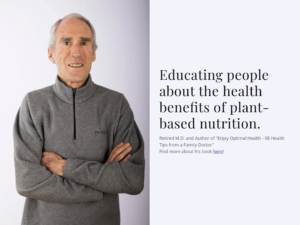Health column by Dr. Greg Feinsinger. Champion of Whole Food Plant Based Living and righteous person.
FEMALE CANCER AND HORMONE BALANCE
This column is another in a series taken from Dr. Neal Barnard’s recent book “Your Body in Balance, The New Science of Food, Hormones, and Health.” Previous columns in this series discussed how what we eat affects our hormones, and today’s column will look at how hormone levels affect propensity for women to develop certain types of cancer.
BREAST CANCER: This is the most common female cancer after skin cancer. In 5 to 10 percent of breast cancer, genetics plays a role, but what we eat and hormone levels can determine whether these harmful genes are turned on or off. Estrogen can penetrate the nucleus of breast cells and damage DNA, which in turn can result in cancer. Once cancerous cells form, estrogen can stimulate them to multiply, and eventually to metastasize. Postmenopausal women with high levels of estrogen have than twice the risk of developing breast cancer compared with women with lower levels.
Fat cells manufacture estrogen, so overweight women are more apt to develop breast cancer. Dairy products contain bovine estrogen, so eating these products increases risk. Diets high in saturated animal fat also increase risk, as do diets high in added vegetable oils. Fiber—which is found in plant but not animal foods—pulls estrogen out of the body via the GI tract, lowering blood levels of estrogen and lowering breast cancer risk. Foods that contain high levels of antioxidants lower breast cancer risk: plant foods, especially fruits and vegetables with intense flavor (herbs and spices) and/or color; also cruciferous vegetables.
Birth control pills raise breast cancer risk slightly, but lower risk of cancer of the ovary, endometrium, and colon. Post-menopausal estrogen replacement clearly increases risk. Alcohol increases risk because it damages DNA, and may have some hormonal effects.
ENDOMETRIAL CANCER: The endometrium is the layer that lines the uterus, and in premenopausal women it is shed monthly (menstruation). Excessive estrogen causes abnormal thickening of the endometrium and increases the risk of cancer. Fat cells manufacture estrogen, and overweight women are at higher risk for endometrial cancer. Excessive estrogen can also come from estrogen replacement therapy in postmenopausal women.
OVARIAN CANCER: This is a dreaded disease, because there is no good screening tests to diagnose it early, and for the most part no effective treatment. Excessive body fat, tobacco, and dairy products including milk and cheese are all linked to cancer of the ovary. The dairy link appears to be due to the milk sugar galactose, which harms ovaries.
Following are Dr. Barnard’s dietary steps for tackling female cancers: 1) Avoid animal products. 2) Minimize added oils, including olive oil. 3) Eat intensely colored fruit and vegetables, such as berries, red cabbage, red onions, carrots, tomatoes, sweet potatoes, peppers, greens. 4) Eat cruciferous vegetables, such as kale, cabbage, broccoli, cauliflower, bok choy, Brussel’s sprouts, and radishes. 5) Eat soy products such as soy milk, tofu, and tempeh, which have been shown to decrease the risk of breast cancer. 6) Get regular exercise, which helps prevent cancer by many mechanisms including controlling excess fat. 7) Avoid or at least cut back on alcohol. 8) Avoid environmental toxins, by eating at the bottom of the food chain (plants).

Leave a Reply